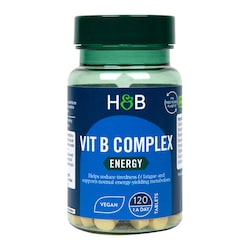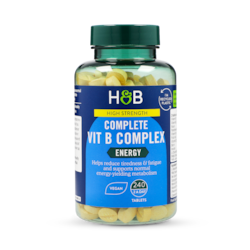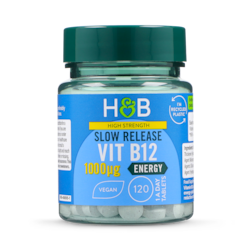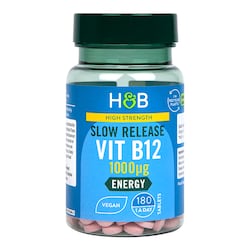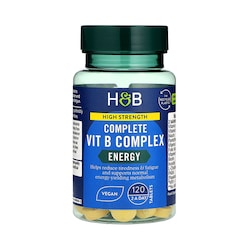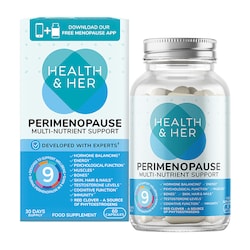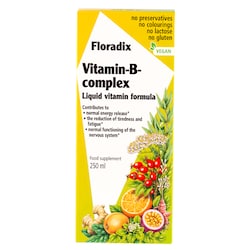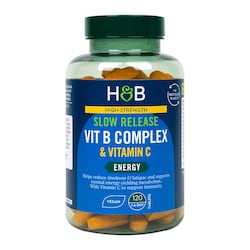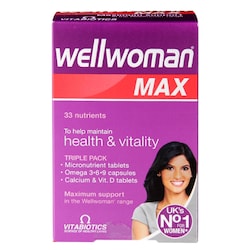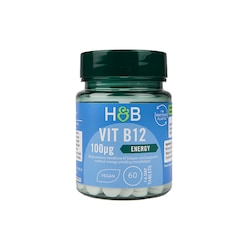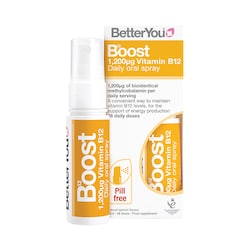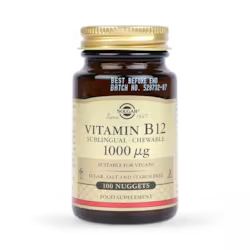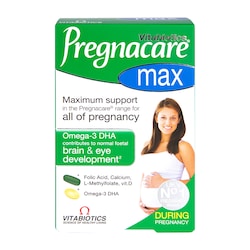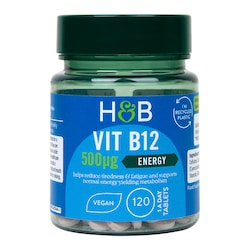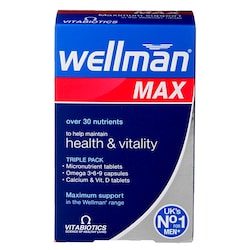20% off £30
Cyanocobalamin: Benefits, dosage, side effects & more

Vitamin B12 is responsible for several key things within the human body. It produces red blood cells and helps keep the nervous system health, as well as releases energy from food.1
Not having enough of it can lead to people developing Vitamin B12 deficiency anaemia. Cue cyanocobalamin, which is a synthetic form of Vitamin B12 prescribed to people help increase their Vitamin B12 levels.2
This article is designed to provide you with an introduction to cyanocobalamin, what it is, what it does, dosage levels, side effects and more…
What is cyanocobalamin?
Cyanocobalamin is the man-made form of Vitamin B12, which is responsible for helping keep our blood and nerve cells healthy. This particular vitamin also plays a key part in the DNA-making process.3
If our levels of Vitamin B12 or folate drop, this can result in the body producing red blood cells that are too large and unable to function properly; otherwise known as Vitamin B12 deficiency anaemia or folate deficiency. If you are anaemic, then you will usually have either abnormally low blood cell levels or not enough haemoglobin in your blood cells.4
Symptoms of being deficient in Vitamin B12, include extreme tiredness, pins and needles, a sore and red tongue, mouth ulcers, muscle weakness and problems with memory.
It’s possible for these symptoms to develop if you are deficient in Vitamin B12 or folate, but do not have anaemia.
Summary
Cyanocobalamin is a synthetic version of Vitamin B12 given to people to help increase their B12 levels and treat Vitamin B12 deficiency anaemia. Being deficient in Vitamin B12 can cause extreme tiredness and muscle weakness, among many other things.
What causes Vitamin B12 or folate deficiencies?
Vitamin B12 and folate deficiencies are more common in older people, with 1 in 10 people, aged 75 or over and 1 in 20 people, aged 65 to 74, lacking in either B12 or folate.5
Reasons for these deficiencies include:
- Pernicious anaemia (the most common cause of Vitamin B12 deficiency in the UK) – this is when your immune system attacks your healthy stomach cells. This prevents your body from absorbing Vitamin B12 from your food.
- A lack of these vitamins in your diet – this is uncommon, but can happen if you have a vegan diet, follow a fad diet or have eaten a generally poor diet for a long time.
- Medication – certain medicines, including anticonvulsants and proton pump inhibitors can impact how much Vitamin B12 and folate your body absorbs.
Summary
Vitamin B12 or folate deficiencies are most commonly caused by having pernicious anaemia, not having enough of it in our diet or taking certain medication that can interfere with the body’s ability to absorb adequate levels of B12 or folate.
Cyanocobalamin benefits and uses
What is cyanocobalamin used for?
Cyanocobalamin is used to treat Vitamin B12 deficiency anaemia. Treatment either involves being given an injection or taking cyanocobalamin tablets.6
There are two different types of injections:
- Hydroxocobalamin – tends to be the recommended option due to the fact it stays in the body for longer. These injections are usually given every other day for two weeks or until symptoms have started to improve. Any on-going treatment after these injections depends on the cause of your Vitamin B12 deficiency.
- Cyanocobalamin - if you need regular injections of Vitamin B12, cyanocobalamin is usually given once a month compared to hydroxocobalamin, which is required every three months. If you are prescribed Vitamin B12 tablets initially or as part of on-going treatment, then these tablets will most probably contain cyanocobalamin and not hydroxocobalamin.
Summary
Cyanocobalamin is used to treat Vitamin B12 deficiency anaemia. Treatment either involves being given an injection of either hydroxocobalamin or cyanocobalamin or taking cyanocobalamin tablets.
What is the best form of cyanocobalamin?
The type of cyanocobalamin that’s prescribed – injection or tablets – depends on your level of deficiency and what’s caused it, i.e. diet, health condition or medication.
If your Vitamin B12 deficiency is caused by there not being enough of it in your diet:
You may be prescribed Vitamin B12 tablets to take every day between meals. Alternatively, you may need an injection of hydroxocobalamin twice a year.7
People who find it difficult to get enough Vitamin B12 in their diet, such as those following a vegan diet, may need to take cyanocobalamin tablets for life.
Good sources of Vitamin B12 include:
- Meat
- Salmon and cod
- Milk and other dairy products
- Eggs
- Marmite
- Fortified breakfast cereals and soy products
If your Vitamin B12 deficiency is not linked to your diet:
You may need to have an injection of hydroxocobalamin every 2 to 3 months for the rest of your life.8
People who also experience neurological symptoms, such as numbness or tingling in their hands and feet, will be referred to a haematologist and could potentially need to have injections every 2 months.
Summary
The type of cyanocobalamin that’s prescribed, injection or tablets, depends on your level of deficiency and what’s caused it, i.e. diet, health condition or medication.
How much cyanocobalamin is safe to take?
When taking cyanocobalamin tablets, always follow the guidance from your GP/medical professional and the manufacturer’s guidelines, which will tell you how many tablets to take a day.9
Cyanocobalamin dosing
Generally speaking, the recommended dosage for cyanocobalamin tablets is one to three tablets a day (for adults and the elderly) and one tablet a day (for children).10
Cyanocobalamin tablets should be taken with water and between meals. Your doctor may alter your dose, depending on how you react to it and if you experience any side effects (see below).
If you miss a dose, take it as soon as you remember, if it’s within a few hours of the normal time. Otherwise, leave out that dose and take your next one at the time it’s usually due. Do not take a double dose to make up for forgetting to take it.
Summary
The dosage for cyanocobalamin tablets is one to three tablets a day (for adults and the elderly) and one tablet a day (for children). Always follow the recommended guidance from your GP on how much to take and when to take them.
Cyanocobalamin side effects and risks
What are the side effects of taking cyanocobalamin?
Cyanocobalamin may cause the following side effects, the most common being diarrhoea and swelling on any part of your body.11
More serious side effects include:
- Sudden weight gain
- Shortness of breath
- Painful breathing
- Wheezing
- Gasping for breath
- Cough with a foamy mucus
- Cold and clammy skin
- Anxiety
- Rapid heartbeat
- Leg cramps
- Constipation
- Irregular heartbeat
- Fluttering in your chest
- Increased thirst or urination
- Numbness or tinging and muscle weakness
What are the risks associated with taking cyanocobalamin?
Cyanocobalamin may cause low potassium levels in the blood, which is referred to as hypokalaemia.12
It may also interact with medication being taken for blood cell production (e.g., chloramphenicol, anti-cancer drugs, HIV drugs), or supplements, such as folic acid. Let your GP know about any medication or supplements you may be taking.
How well it’s absorbed by the body may also be affected by the following medication:13
- Neomycin and chloramphenicol (antibiotics)
- Colchicine, a treatment for gout
- Biguanides, e.g. metformin, which are used to treat diabetes
- Cholestyramine, which is used to reduce the amount of cholesterol (fats) in the blood
- Potassium chloride, which is used to correct potassium deficiency
- Methyldopa, which is used to treat high blood pressure
- Cimetidine, which is used to treat excess acid in the stomach causing indigestion or ulcer
- Oral contraceptives
Note - antibiotics (used to treat infections) and antimetabolites (used to treat some cancers) can potentially affect the blood tests used to measure Vitamin B12 levels.
Meanwhile, pregnant women should only take cyanocobalamin tablets, if advised to do so by their GP. This is due to the fact it may pass into breast milk; breastfeeding women should also consult their GP before taking cyanocobalamin.
Summary
Diarrhoea and body swelling are among the more common side effects of taking cyanocobalamin. More serious side effects include shortness or gasping for breath, rapid or irregular heartbeat and a cough with a foamy mucus.
A final few words about cyanocobalamin
While Vitamin B12 may be present in several different food products, cyanocobalamin is an artificial form of B12. It can either be given as an injection or tablet/supplement form to help people overcome Vitamin B12 deficiency anaemia.14
Injections of cyanocobalamin are usually given once a month however, hydroxocobalamin (another form of Vitamin B12), which can be given every 3 months, tends to be the most common injection given by the NHS. However, if you are required to take tablets to increase your B12 levels, then they will usually contain cyanocobalamin.
Always speak to your GP first before taking cyanocobalamin or Vitamin B12 supplements.
For more on Vitamin B12, check out this article, ‘Vitamin B12: Function, foods, deficiency and supplements.
Last updated: 10 May 2021
Vitamin B12: function, foods, deficiency and supplements
This vital vitamin helps your body convert food into energy. Discover the benefits of vitamin B12, how much you need, food sources, and supplements here.


- https://www.nhs.uk/conditions/vitamins-and-minerals/vitamin-b/
- https://med.libretexts.org/Courses/American_River_College/General_Nutrition_Textbook_(not_Plant-Based)
- https://www.rxlist.com/consumer_cyanocobalamin_vitamin_b12/drugs-condition.htm
- https://www.nhs.uk/conditions/vitamin-b12-or-folate-deficiency-anaemia/
- https://www.nhs.uk/conditions/vitamin-b12-or-folate-deficiency-anaemia/
- https://www.nhs.uk/conditions/vitamin-b12-or-folate-deficiency-anaemia/treatment/
- https://www.nhs.uk/conditions/vitamin-b12-or-folate-deficiency-anaemia/treatment/
- https://www.nhs.uk/conditions/vitamin-b12-or-folate-deficiency-anaemia/treatment/
- https://www.medicines.org.uk/emc/files/pil.5716.pdf
- https://www.medicines.org.uk/emc/files/pil.5716.pdf
- https://www.rxlist.com/cyanocobalamin-drug.htm
- https://www.rxlist.com/cyanocobalamin-side-effects-drug-center.htm
- https://www.medicines.org.uk/emc/files/pil.5716.pdf
- https://www.nhs.uk/conditions/vitamin-b12-or-folate-deficiency-anaemia/treatment/


